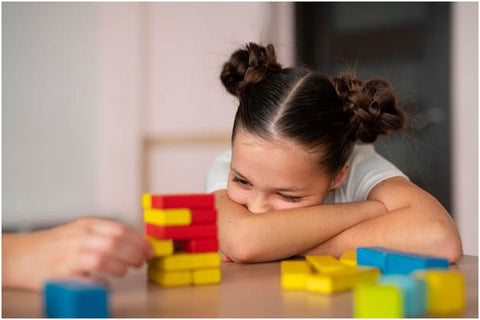In a world filled with uncertainties and challenges, equipping our children with the tools to not just survive but thrive is paramount. The journey from childhood to adulthood is sprinkled with various hurdles. Yet, it's these very obstacles that can mold our children into resilient, compassionate, and capable individuals. Raising resilient kids is a multifaceted endeavor that involves nurturing their mental, emotional, and social faculties. This blog post delves into the critical aspects of building mental strength in children, offering practical tips to help them emerge from challenges stronger and more prepared to face the world.
Understanding the Pillars of Resilience
Resilience is a multifaceted skill, cultivated through guidance and deliberate practice. At its heart, it involves the capacity to recover quickly from difficulties, adapt well to change, and persist in the face of adversity. Key to this ability are several foundational pillars: self-awareness, which enables individuals to recognize their feelings and thoughts; self-regulation, the skill to manage emotions and behaviors in various situations; optimism, an outlook that encourages seeing the brighter side of life and maintaining hope for the future; mental agility, the flexibility to think creatively and solve problems; and the willingness to seek support, acknowledging when help is needed and taking steps to obtain it. Strengthening these core areas in our children lays the groundwork for a resilient mindset, allowing them to approach life's challenges with confidence and determination.
Encouraging Open Communication and Emotional Expression
Creating an environment where children feel comfortable expressing their emotions and thoughts is essential for their emotional development and resilience. A household that prioritizes open communication encourages kids to share their innermost feelings without fear of judgment. This transparency aids in the development of emotional intelligence and the ability to empathize with others. By practicing active listening and validating their children’s experiences, parents can guide their offspring in navigating their emotions healthily. Such an environment not only fortifies the bond between parent and child but also arms youngsters with the emotional dexterity needed to tackle life’s inevitable challenges. Engaging in regular, heartfelt discussions about both mundane and significant matters lays the foundation for a resilient mindset, preparing children to approach adversities with confidence and a sense of security in their support system.
Modeling Resilient Behavior
Parents play a critical role in demonstrating resilience to their children by how they handle their own challenges and setbacks. By exhibiting positive coping mechanisms—such as seeking support when needed, expressing emotions in healthy ways, and viewing failures as opportunities for growth—parents provide a live blueprint for resilient behavior. It’s essential for caregivers to openly discuss their struggles and the strategies they employed to overcome them, without shielding their children from every difficulty they face. This transparency not only demystifies the process of bouncing back from setbacks but also empowers children to adopt similar attitudes and behaviors in their own lives. Furthermore, showing vulnerability by admitting mistakes and emphasizing the learning gained from them reinforces the message that perfection is not the goal; rather, it's the journey of overcoming obstacles that builds true resilience. By living these principles, parents foster an environment where resilience is not just taught but embodied, offering their children tangible examples of how to navigate life's inevitable challenges.
Fostering Independence and Problem-Solving Skills
Nurturing a child's autonomy and ability to confront issues head-on is a cornerstone of resilience. This journey begins by allowing them the room to exercise choice, navigate their own paths, and approach problems with creative solutions. Such empowerment comes from giving them age-appropriate challenges and resisting the urge to immediately step in when they face obstacles. Instead, guiding them with open-ended questions that lead them to think critically and derive solutions enhances their problem-solving capabilities. This practice not only bolsters their confidence but also ingrains in them a belief in their own capacity to deal with life’s hurdles. Encouraging this level of self-reliance doesn’t mean leaving them to face everything alone but involves a balanced approach of support and autonomy that prepares them for the complexities of life outside the familial sphere.
Cultivating a Growth Mindset
A growth mindset is integral for developing resilience in children. It shifts their perspective to view challenges as avenues for development rather than impassable barriers. By embracing this mindset, kids learn that their abilities and intelligence can expand through dedication and hard work. Parents can nurture this mindset by focusing on effort rather than outcomes, underscoring the importance of persistence in the face of failure. Celebrating the process of learning, regardless of the immediate result, instills a love for overcoming obstacles and teaches children that setbacks are part of the growth journey. Encouraging them to embrace challenges with curiosity and enthusiasm, rather than fear or avoidance, lays the foundation for lifelong resilience and adaptability. This approach reinforces the understanding that effort and perseverance are key to unlocking their potential, fostering an environment where children are motivated to strive for continuous improvement and see every obstacle as an opportunity to advance.
Establishing Routines and Setting Boundaries
Routines and clear boundaries are essential scaffolding in a child's development, fostering a predictable environment where they can flourish amidst life's unpredictabilities. By implementing structured daily habits, children acquire a sense of normalcy and control, crucial during times of change or stress. This stability aids in developing their executive functioning skills, enabling them to plan, focus, and remember instructions more effectively. Parents play a pivotal role in setting these routines, from consistent bedtime rituals to designated study times, which instill discipline and help manage expectations. Similarly, establishing boundaries teaches children about consequences and personal responsibility, guiding them in understanding social norms and respecting others' limits. These practices are not about strict adherence to rules but about creating a secure framework within which children can explore, learn, and grow. Engaging children in the creation of these routines and boundaries also promotes their sense of agency, contributing to their resilience by making them active participants in their own development.
Promoting Positive Relationships
Promoting positive relationships is a cornerstone of resilience, providing children with a network of support for navigating life's ups and downs. Fostering these connections involves more than just encouraging interaction; it's about teaching children the value of empathy, understanding, and mutual respect. By demonstrating how to engage in meaningful conversations, resolve conflicts peacefully, and express appreciation for others, parents can guide their children in building lasting, supportive relationships. Organizing family activities, encouraging participation in group sports or clubs, and facilitating opportunities for children to socialize in diverse settings can further enhance their social skills and expand their circle of support. Importantly, modeling respectful communication and showing how to maintain healthy relationships in one's own life gives children a blueprint to follow. These efforts ensure that children don't just form connections but also nurture them, creating a solid foundation of support as they grow.
Finding Strength in Adversity
Adversity, though often viewed through a lens of negativity, holds within it the seeds of growth and transformation. Encountering obstacles and setbacks is an inevitable part of life's journey, yet it is precisely these moments that can forge in children an unwavering strength and an indomitable spirit. By guiding our children to approach difficulties with a mindset that sees beyond the immediate struggle to the potential for personal development, we enable them to discover their inner resilience. It's important for parents to foster an environment where children feel safe to face challenges, knowing they have a supportive network behind them. This includes teaching them to break down overwhelming problems into manageable pieces, helping them to develop actionable strategies for overcoming obstacles. Celebrating their successes, no matter how small, reinforces their confidence and fortifies their resolve to persevere. Through these experiences, children learn that their response to adversity defines their character and growth more than the adversity itself.
Building Self-Compassion in Kids
In cultivating resilience, fostering self-compassion in children is indispensable. This process involves teaching them to embrace their imperfections and view failures not as indicators of their worth but as opportunities for growth and learning. Parents can lay the groundwork for self-compassion by normalizing mistakes and emphasizing their role in personal development. This includes offering comfort and understanding when children are hard on themselves and sharing personal experiences of overcoming self-criticism. Additionally, integrating mindfulness practices into their daily routine can teach children to acknowledge their feelings without judgment and respond to themselves with kindness in moments of difficulty. By highlighting the importance of speaking to oneself with the same compassion they would offer a friend, parents instill a habit of positive self-talk. This nurturing approach ensures children learn to treat themselves with kindness, fostering a resilient spirit that can face challenges with a balanced and self-compassionate outlook.
Visit Our Website www.sp12shop.com For Family Matching T Shirts






